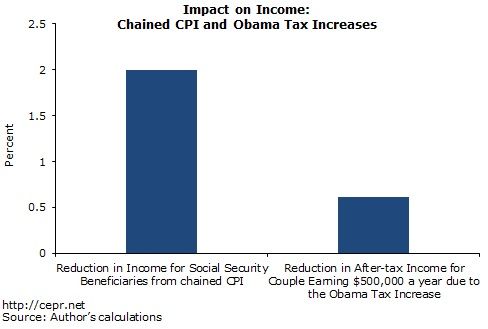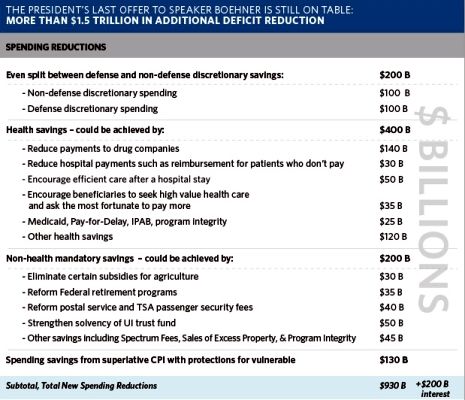President Obama formerly released his budget for 2014. As, expected it contained the cuts to Social Security and Medicare that have are an anathema to the left. As has been pointed out before on this site, these proposals for the sake a few dollars in revenue increases and a paltry $50 billion investment for infrastructure improvement. That is bad policy and even worse politics. If you don’t believe that, well here is a sample of the criticism from the right:
Americans for Tax Reform, the advocacy group that asks lawmakers to sign a formal “Taxpayer Protection Pledge,” said Tuesday that chained CPI violates the pledge.
“Chained CPI as a stand-alone measure (that is, not paired with tax relief of equal or greater size) is a tax increase and a Taxpayer Protection Pledge violation,” the group said in a blog post.
Anti-tax crusader Grover Norquist, leader of the organization, criticized the policy via Twitter on Wednesday. “Chained CPI is a very large tax hike over time,” Norquist wrote. “Hence Democrat interest in same.”
The Congressional Budget Office estimates (pdf) that chained CPI would reduce Social Security spending by $127 billion and increase tax revenue by $123 billion over 10 years.
When asked Friday if chained CPI represents a tax hike on the middle class, White House spokesman Jay Carney said, “I’m not disputing that.“
Can you hear the political ads attacking Democrats with this? So much for electoral victory in 2014, Obama just sold that prospect for what? Trying to make the point that Republicans are intransigent? American already know that. A few dollars of revenue from tax reforms that will be changed the first chance the Republicans get, like the debt ceiling hostage situation? We seen this scene played out how many times with Obama caving to Republican demands because some vague fear about the economy.
Predictably the left is outraged and there are threats from left wing organizations to primary any Democrat who votes for chained CPI.
Warren joins lawmakers in criticizing Obama budget
A coalition of prominent Democrats, including many from New England, slammed President Obama’s $3.8 trillion budget blueprint Wednesday for its proposed changes to the Social Security payment formula and Medicare, opening a widening rift between the president and members of his own party.
Senator Elizabeth Warren of Massachusetts said she was shocked by Obama’s proposal to recalculate the cost of living adjustment for Social Security beneficiaries by linking it to a different version of the Consumer Price Index, known as the “chained CPI.” [..]
“In short, ‘chained CPI’ is just a fancy way to say ‘cut benefits for seniors, the permanently disabled, and orphans,'” Warren fired off in an e-mail to supporters. She related the experience of her brother, David Herring, a military veteran and former small business owner who lives on monthly Social Security checks of $1,100. “Our Social Security system is critical to protecting middle-class families,” she wrote, “and we cannot allow it to be dismantled inch by inch.” [..]
Representative Edward Markey of Massachusetts called “chained CPI” an abbreviation for “Cutting People’s Income, a wrong-headed change that would go back on the promise we make to our senior citizens.”
“Tea Party Republicans may have pushed the president into many of these difficult decisions, but it still does not make this budget right nor fair, especially for those Americans who need help the most,” Markey said.
MSNBC’s All In host Chris Hayes discussed the chained CPI with Sen. Jeff Merkley (D-OR), Jonathan Alter, Heather McGhee, and Mattie Duppler, Americans for Tax Reform.
Transcript for this video can be read here
This a direct attack by a Democratic president on our earned benefits. Time to start calling and don’t stop until this deal is dead and buried.
The White House switchboard is 202-456-1414.
The comments line is 202-456-1111.
h/t Susie Madrak at Crooks and Liars



Recent Comments